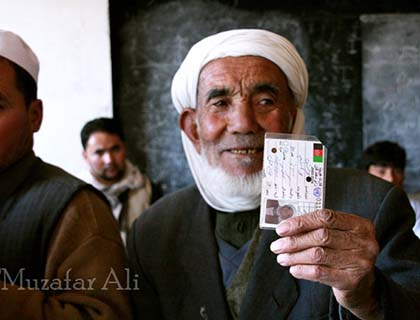KABUL - An American organization tasked with furthering democracy in developing nations said Monday that while elections next April in Afghanistan are unlikely to be perfect, they should be better than previous polls marred by widespread fraud.
The National Democratic Institute for International Affairs said its assessment mission to Afghanistan believes there is "guarded optimism" about the April 5 polls that will elect a new president to succeed Hamid Karzai, along with local council members for the country's 34 provinces.
But the organization said the elections still face serious challenges, including security, potential fraud and even weather conditions that could affect voter turnout.
The 2009 presidential election was so soiled that U.N.-backed fraud investigators threw out more than 1 million votes — enough to force a second round. Many observers blamed much of the fraud on Karzai's supporters, but he blamed the U.S. for allegedly interfering against him. In the end, the opposing candidate dropped out and Karzai was elected was elected to a second and final five-year term.
Since then, reforms in the voting process have tried to make the elections commissions more independent of the presidency.
"Clearly, steps have been taken since then to address many of those issues," said Karl Inderfurth, a former U.S. assistant secretary of state for South Asian affairs who headed the mission. "They (Afghan commissions) cannot promise a perfect election, no nation can for that matter, but I think it would be a better election than the last one,"
For the first time since the U.S.-led invasion in 2001, the vote will be completely run and monitored by Afghans. Foreign involvement has been limited to technical assistance and funding.
A statement from the NDI mission said the Afghan reforms "brought a guarded optimism among many political and civic actors that the 2014 polls would be an improvement over previous elections," but also warned that "there are serious challenges that could impact the integrity of the 2014 elections."
The NDI was created by the U.S. government through its National Endowment for Democracy and is mostly funded by American taxpayers.
Security is a key concern in a country that is still at war more than 12 years after the Taliban were ousted, and is plagued by a relentless insurgency that shows no sign of abating. The Taliban have called on Afghans to boycott the elections.
"In terms of challenges, I think the most important would be security, whether or not all Afghans would be able to turn out to vote," Inderfurth said.
Another concern is weather. Much of mountainous Afghanistan is covered in snow even as late as April, and many of its more remote regions are inaccessible.
A final issue is fraud, a danger increased by spotty records, Inderfurth added.
Afghan election officials have said they can only estimate how many voters are really on the rolls in this country of about 30 million people. Adding to the confusion are millions of additional registration cards that remain from past elections.
Officials with Afghanistan's Independent Election Commission have said that 20.7 million registration cards have been issued since the first post-Taliban elections were held, while the commission's best estimate for the number of eligible voters is 12 million. Afghanistan has had no comprehensive official census in nearly three decades.
Compounding the anxiety is uncertainty over whether Afghanistan and the United States will sign a long-delayed security agreement that could keep thousands of American troops here for up to a decade.
Karzai, who can't run for a third term, says he backs the deal but balks at signing it himself. Although a national assembly of 2,500 delegates known as the Loya Jirga endorsed the deal in November and backed a U.S. request that it be signed by the end of the year, Karzai is deferring that to his successor.
Much is as stake if the deal falls apart. Afghanistan could lose up to $15 billion a year in aid, effectively collapsing its fragile economy and making it unable to pay its army and police.
"There is support (for the deal) from the Loya Jirga that was held, there is support from the candidates that are running for the office, there is support from the civil society groups, the women groups — they want to see the continued presence of the international community," Inderfurth said. "This will work out, I am relatively confident, since I believe that this agreement is in the best interest of both countries." (AP)

